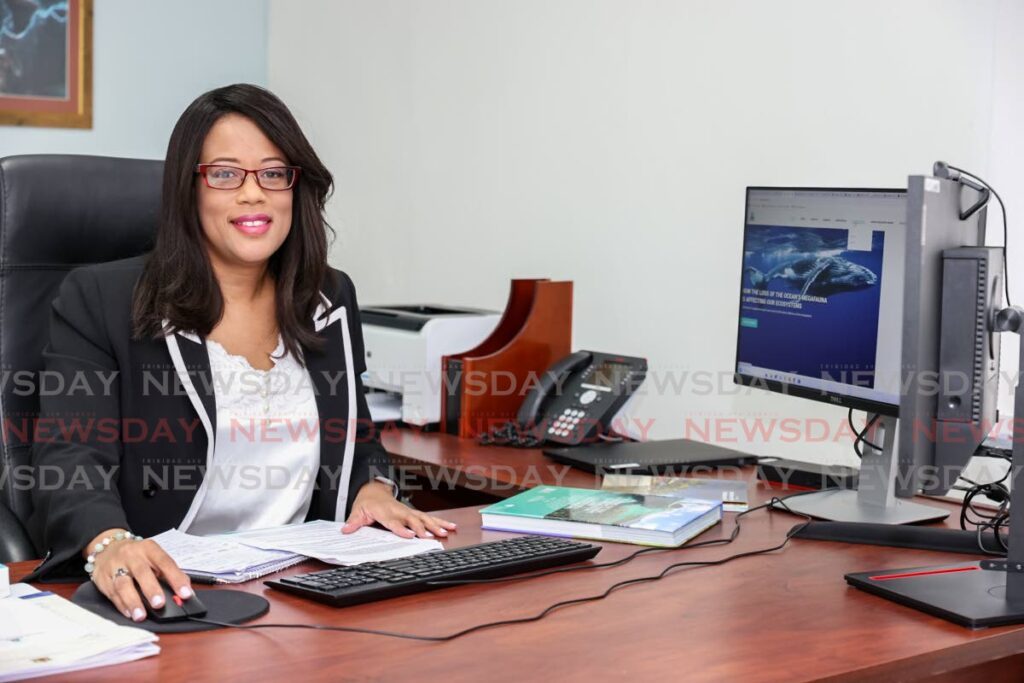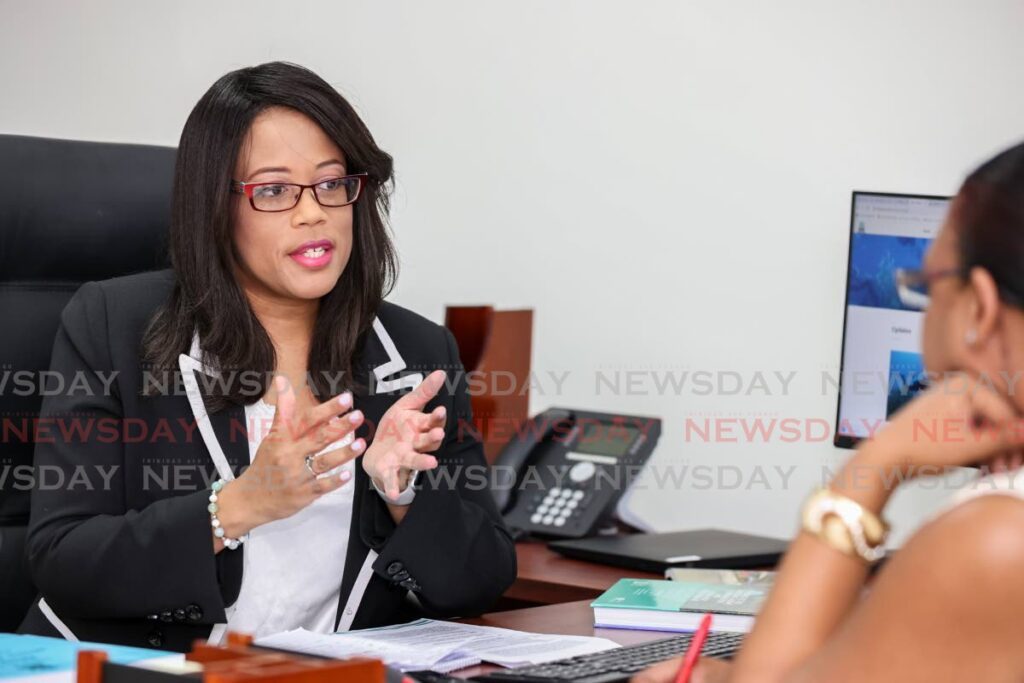Dr Ava Maxam vows to protect the energy of the ocean

One of Dr Ava Maxam’s first memories was of the sea, of being submerged in Jamaica’s waters by her mother. Since then, she has been fascinated by the ocean.
As the new director of the Institute of Marine Affairs (IMA), she intends to do all she can to keep the ocean safe and make a difference for those whose livelihoods and lives depend on it.
Appointed on September 4, Maxam said her role is to ensure the growth of the institute meets the goals of both the government and what is mandated in the IMA Act by advising the government on managing and protecting marine resources so it can create policies based on data.
She plans to ensure the organisation’s goals and objectives keep up with the time, that projects are practical and can be implemented, and to make an impact on the world.
One of her primary directives, she said, is looking at how the IMA could collaborate regionally and use its research to lead the Caribbean in the field.
"It's not enough nowadays to say, 'Oh, we're doing research on the macrofauna or zooplankton of our oceans.' But now we have to take a deeper look at how it affects people’s livelihood. How does it make what we do more valuable? How does it make that impact to what we're doing?
"And not just at our local level for government, but we have to start thinking regionally as well. TT, our islands, we're a part of the Caribbean system. And when it comes to oceans and marine dynamics, currents and waves don't care that we're a different jurisdiction. So as island nations, we're all affected by the system that we're in."
She believes it is important to modernise how services are distributed, to improve on information technology and infrastructure and strengthen digital systems, thereby improving efficiency and communication.
Innovation is also important so the IMA’s research has a broader reach.
For example, she said TT could introduce carbon trading. It is a system in which companies are allowed to produce a certain amount of emissions and, if they stay below their limit, they can trade the extra to other companies that want to produce more.
TT could also establish green bonds, in which companies with large carbon footprints could contribute financially to building the environment by helping to fund green or environmentally-friendly companies and projects.
Maxam said her vision for the IMA is not just about traditional environmental monitoring and stewardship, but how the organisation could lead the region in the way it operates, which would call for supporting regulations and legislation.
Maxam told WMN the IMA’s areas of focus is biodiversity and ecology, oceanography and coastal processes, environmental quality, marine governance and policy, and fisheries and aquaculture.
“We might not traditionally see how doing environmental work impacts our everyday lives, our assets and so on. But it really does, because the environment is something that is always dynamic. You could have a hurricane passing through, we could have a storm surge or tsunami that impacts the coastline and causes flooding, and so on.
“What we're realising more and more is that if we don't have certain natural systems in place, then there's no buffering to prevent that energy from reaching our shores. Our coral reef, mangrove, seagrass – these are natural shoreline systems that have been there for thousands of years to try and protect us from certain energetic events.
“For Caribbean islands, a lot of our main cities, ports, a lot of our industries are found on our shorelines, so if those are not strong and thriving, immediately, that's a big exposure for us.”
She wants to help put things in place to make Caribbean islands more resilient to the impacts of natural and man-made events.
Personally, she is concerned about how the Caribbean is adapting to climate change as well as modernising the use of its resources and protecting people’s livelihoods.
She noted that most Caribbean countries have signed on to various conventions. She has worked on approximately 68 projects in 12 Caribbean countries, including Jamaica, Guyana, TT, St Vincent, St Lucia, Grenada, Barbados, and Belize to establish information-gathering systems to report to those conventions.
She said while each country had its unique issues, there were common ones. And she believes the Caribbean has to be united in how it tackles and adapts to climate change.

She added that the IMA was in the design phase of setting up a field station in Tobago and wants to push blue-economy initiatives in which people can make a living from environmentally sustainable jobs. It also hopes to build strong internship programmes to engage youths and let them experience what the IMA does.
Passion and love
Maxam explained there is a tradition in her family of dipping their children underwater and one of her first memories was her mother doing that to her, introducing her to the sea.
“I distinctly remember opening my eyes underwater, and seeing this lovely blue filtering of the light, dancing and everything and I felt the energy of the ocean. I could feel that this is a powerful thing that I'm in.
“Ever since that, I've always been curious. What is this? What is this about? What drives it? How do we live with it? When the ocean or nature gets angry on you, how do you protect yourself from it? And that’s where it started.”
She described herself as a water baby, saying she loves marine activities, including scuba diving and snorkelling.
But even though the ocean has always been a love and passion, for a long time she did not know what she wanted to do as a career.
In 1999, she got a bachelor’s degree in zoology and botany at UWI, Mona Campus in Jamaica. She said her parents wanted her to do medicine but she was not interested, so she took courses that were ‘kinda related” so as not to hurt her parents’ feelings.
“I found that I did not like any of those things. In the last semester of my third year I was introduced to an oceanography course and said, ‘Yes. This is what I want to do. This is more up my alley.’ So I switched more to the geosciences and physical sciences.”
She took on consultations in the environmental field, doing environmental impact assessments and monitoring with coastal engineering companies.
“After no time, I was leading oceanographic assessments, marine assessments, so that was very, very good experience. When I started doing my PhD, I would have had some of that work experience. So a lot of things came together for me.”
She finally decided to make a living doing what she loved, and started a masters in oceanography – when she got caught in her first rip current while scuba diving near a coral reef.
She was installing equipment on the sea floor when she experienced what felt like a hurricane underwater. The current started to rip off her goggles and breathing equipment. She had to hold on to the equipment with one hand and, with the other, held her breathing equipment and goggles to her face while bits of debris bombarded her.
“It was like when I was a child, and I realised, ‘Wow, this thing's really powerful.’ It reminded me this is a lot of foreign energy here, and there's very little we understand about it. It really got me hooked.”
She was upgraded to a PhD and graduated from UWI, Mona in 2009. Because of the rip tide experience, she chose to study coral-reef systems and their current dynamics so she would know how to protect people.
"Yes, I did my PhD in oceanography, and that was like a stepping stone to me. I've learned this lesson where, regardless of where your degree is, you still have to try and figure out how to make the best out of things."
She went on to do a cert coastal systems course with the UNESCO-IHE Institute for Water Education in the Netherlands in 2013 and got into geographic information systems, where she helped design software and systems for decision-making systems.
Maxam said she loved working with engineering companies because of their practicality and efficiency. But she also enjoyed working with Mona GeoInformatics Institute, which she did for over 17 years, consulting for private companies, NGOs and governments.
She has chaired and sat on several boards related to the environment, public affairs, education and business development, including Government of Jamaica appointments to the Natural Resources Conservation Authority (NRCA) Board, the National Environment and Planning Agency Advisory Board, Town and Country Planning Authority Board, the NRCA Beaches and Coastal Resources Committee and the Cannabis Licencing Authority Board.
She has also received many awards, including the Principal’s Research Award from UWI Mona, the Scientific Research Council’s S and T XXtrordineer Jamaica, the FIPA Award of the Century in Science and Technology from the Farquharson Institute of Public Affairs, the National RJR-Gleaner Honour Award for Science and Technology, the LICJ National Best Practices in GIS Award for the Integrated Crime and Violence Information System, and more.
"I think when people have recognised me by giving me awards, sometimes it takes me by surprise. The first time that happened was when the Garmin company, an American company that supplies navigation systems, made us official Garmin map developers.
"We had developed the navigation system for Jamaica where it worked across the entire island. And Garmin said to us at the time, 'You know, you guys are the first to develop a fully functioning navigation system for your entire country south of the US.'
"We were like, 'Wait, what?' So that was an accomplishment that that we're very, very proud of.
“I'm bringing all of this experience with working through these different islands, different jurisdictions, seeing what is common, seeing what is unique to each, and seeing how I can help to build up the IMA with that experience, and those skills that I've learned.”
On moving to TT with her nine-year-old daughter, she said she has been visiting TT for decades, and has many cousins and friends in the country so it feels like home.
She added that she wants to balance her family, work and her well-being, and TT has a lot of outdoor activities to keep her engaged outside work and bond with her family.


Comments
"Dr Ava Maxam vows to protect the energy of the ocean"